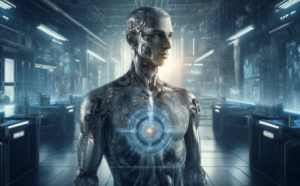Kissinger’s Final Threat Exposes Globalists’ Dystopian End Game: ‘Bioengineer to Co-exist with AI—or Die’
In his final message to humanity, Henry Kissinger co-authored a disturbing book titled Genesis, published recently. Kissinger’s final message for humanity warns that artificial intelligence (AI) will create “superhumans,” meaning ordinary humans become “useless.”

Kissinger passed away last year, but his co-authors, Eric Schmidt and Craig Mundie, completed the book to honor his dying wish. Their chilling message: to avoid being overtaken by advanced machines, humans may need to biologically engineer themselves to merge more seamlessly with AI.
Concepts like brain-computer interfaces, they argue, could lead to a society where humans are redefined to work alongside AI tools.
The authors even explore the dystopian idea of creating hereditary genetic lines specifically designed to interact with AI. While they acknowledge this scenario as undesirable—warning it could split humanity into permanently unequal classes of power—it remains a possibility in their vision of the future.
Highlighting an article published in The Washington Times about the book, Patrick Wood commented: “Trilateral Commission members Eric Schmidt and the late Henry Kissinger express the endgame of fellow member Zbigniew Brzezinski’s Technetronic Era, aka Technocracy: those who will control the world are the superhumans who are genetically hacked or otherwise merged with advanced technology like AI. Their book, ‘Genesis’, talks about taking intelligent design out of God’s hands and giving it over to post-human designers of co-evolution.”
The following was originally published by The Washington Times on 19 November 2024.
Humanity should begin preparations to no longer be in charge of Earth because of artificial intelligence, according to a new book from the late statesman Henry Kissinger and a pair of the country’s leading technologists.
The rise of AI creating “superhuman” people is a major topic of concern in Genesis. It’s the “last book” from Kissinger, according to the publisher’s parent company Hachette. Kissinger was a longtime US diplomat and strategist who died last year at age 100.
Kissinger’s co-authors, former Google CEO Eric Schmidt and longtime Microsoft senior executive Craig Mundie, finished the combined work after Kissinger’s death, and The Washington Times has obtained an advance copy. Mr. Schmidt and Mr. Mundie wrote they were among the last people to speak with Kissinger and sought to honor his dying request to finish the manuscript.
The authors offer a bracing message, warning that AI tools have already started outpacing human capabilities so people might need to consider biologically engineering themselves to ensure they are not rendered inferior or wiped out by advanced machines.
In a section titled Coevolution: Artificial Humans, the three authors encourage people to think now about “trying to navigate our role when we will no longer be the only or even the principal actors on our planet.”
“Biological engineering efforts designed for tighter human fusion with machines are already underway,” they add.
Current efforts to integrate humans with machine include brain-computer interfaces, a technology that the US military identified last year as of the utmost importance. Such interfaces allow for a direct link between the brain’s electrical signals and a device that processes them to accomplish a given task, such as controlling a battleship.
The authors also raise the prospect of a society that chooses to create a hereditary genetic line of people specifically designed to work better with forthcoming AI tools. The authors describe such redesigning as undesirable, with the potential to cause “the human race to split into multiple lines, some infinitely more powerful than others.”
“Altering the genetic code of some humans to become superhuman carries with it other moral and evolutionary risks,” the authors write. “If AI is responsible for the augmentation of human psychic capacity, it could create in humanity a simultaneous biological and psychological reliance on ‘foreign’ intelligence.”
Such a physical and intellectual dependence may create new challenges to separate man from the machines, the authors warn. As a result, designers and engineers should try to make the machines more human, rather than make humans more like machines.
But that raises a new problem: choosing which humans to make the machines follow in a diverse and divided world.
“No single culture should expect to dictate to another the morality of the intellects on which it would be relying,” the authors wrote. “So, for each country, machines would have to learn different rules, formal and informal, moral, legal, and religious, as well as, ideally, different rules for each user and, within baseline constraints, for every conceivable inquiry, task, situation, and context.”
The authors say society can expect technical difficulties, but those difficulties will pale in comparison with designing machines to follow a moral code, as the authors said they do not believe good and evil are self-evident concepts.
Kissinger, Mr. Schmidt and Mr. Mundie urged greater attention to aligning machines with human values. The trio said they would prefer that no artificial general intelligence surpassing humanity’s intellect is allowed to emerge unless it is properly aligned with the human species.
The authors said they are rooting for humanity’s survival and hope people will figure it out, but that the task will not be easy.
“We wish success to our species’ gigantic project, but just as we cannot count on tactical human control in the longer-term project of coevolution, we also cannot rely solely on the supposition that machines will tame themselves,” the authors wrote.
“Training an AI to understand us and then sitting back and hoping that it respects us is not a strategy that seems either safe or likely to succeed.”
yogaesoteric
December 11, 2024
